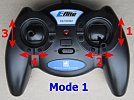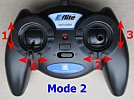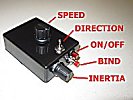

|
Rx60-1 Instructions (v6.0.1/2)
|

|

|

|

|

|
1. DEFAULT SETUP
|
Item |
Setting | Details |
|
Purpose: |
Rx60-1 |
Train with joystick transmitter |
|
Red wire positive (+) Black wire negative (-) |
Battery |
3-16v Observe polarities |
|
H1 output Brown wires Direction |
Motor Ch1 (Throttle) Ch3 (Elevator) |
Integrated forward/reverse ESC for brushed motors Low off (for full stick power control) Move stick in required direction then release Only effective when stopped |
|
P1 output |
Servo Ch2 (Aileron) |
Offset servo for coupling (mid-stick closed) Servo may need separate 4-6v power supply (UBEC) |
|
P2 output |
Front Light Ch4 left (Rudder) |
Led needs current limiting resistor Ch4 used as latching on/off switch Move stick left and release to toggle on/off |
|
P3 output |
Rear Light Ch4 right (Rudder) |
Led needs current limiting resistor Ch4 used as latching on/off switch Move stick right and release to toggle on/off |
|
Arming: |
Enabled |
Ch1 to low position (off) |
| LVC | Enabled |
LVC=Low Voltage Cutoff Led 5-flash if triggered Stop and charge battery |
| Inactivity Sleep | Enabled |
Invoked after 1hour Switch off and on to restart |
2. EXAMPLE CONNECTIONS:

|

|

|
'P' outputs are 3v when on and 0v when off. Led's need resistors to limit current to 20mA but high brightness led's allow a lower current (eg: 2-5mA). Google will reveal how to select resistor values but 220-470ohms will be safe starting values.
Servos can be powered direct from 1S lipo but 2S is normally too high. A 4 or 5v regulator is usually needed.
3. BINDING
Bind once (not necessary if Rx was supplied pre-bound):
1. Switch Rx on and wait ~20s until led flickers fast.
2. Switch Tx on in bind mode.
3. Rx led should flash slowly; wait for it to go solid.
Change distance between Tx/Rx if binding does not work.
4. LED:
Led On = perfect reception (real-time indicator).
1 flash = Scanning (~2sec between flashes; no signal or not bound if never stops).
5 flash = LVC/Brownout (voltage went too low; check battery/motor load).
5. FAILSAFE:
The motor output is not active on startup and while scanning for a signal.
The motor output 'holds' last known settings on short signal losses (<1sec) and then slows to a stop over 3 seconds.
6. OTHER:
This receiver has other features that are not described.
These are changed using a technique called 'programming':
| Version |
v6.0.2 v6.0.1 |